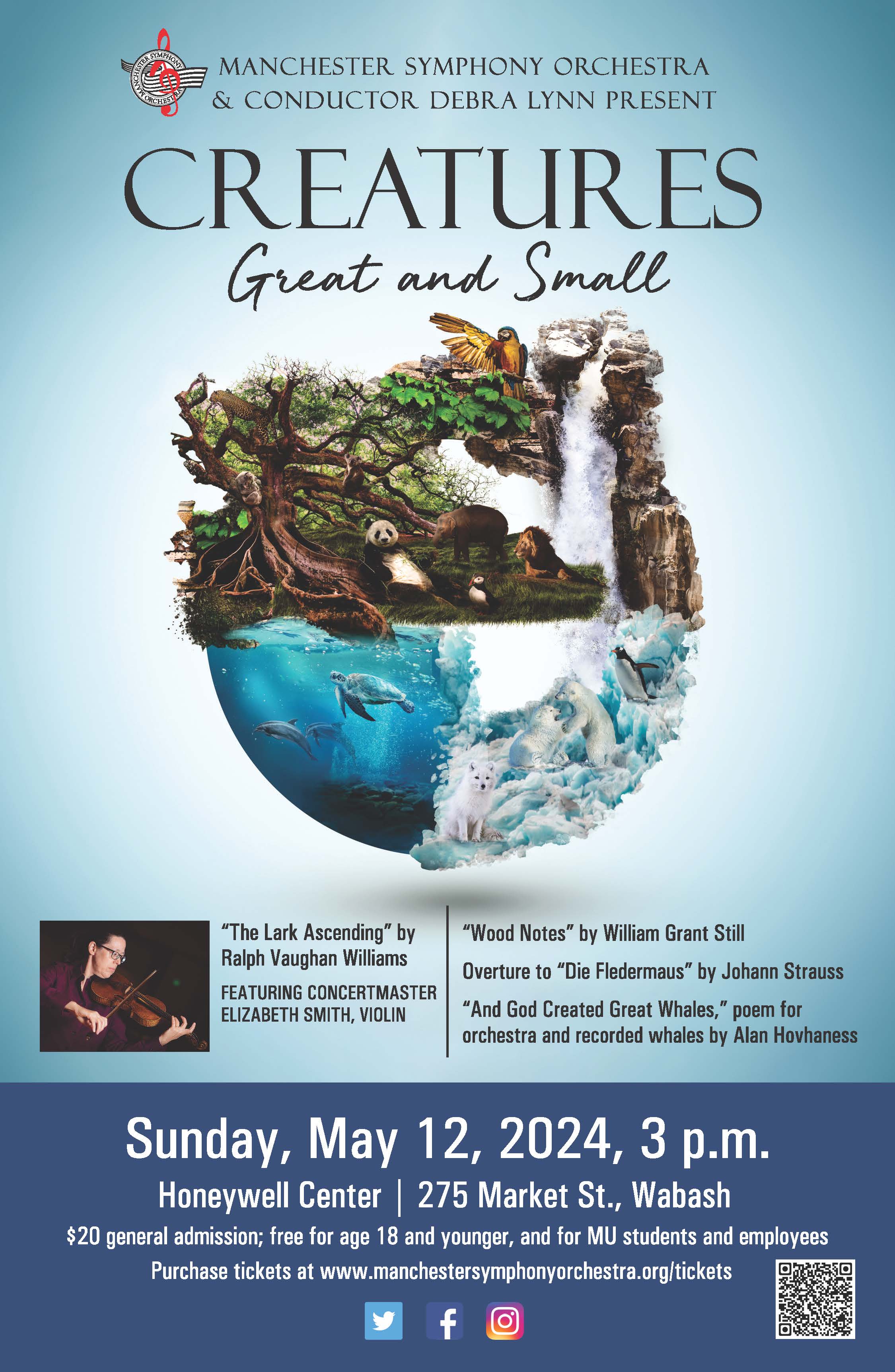Manchester Symphony Orchestra concludes its 85th season with a concert honoring the wonder and beauty of nature. "Creatures Great and Small" is 3 p.m. Sunday, May 12 at the Honeywell Center in Wabash, Ind.
Manchester Symphony Orchestra concludes its 85th season with a concert honoring the wonder and beauty of nature. "Creatures Great and Small" is 3 p.m. Sunday, May 12 at the Honeywell Center in Wabash, Ind.
The concert features MSO Concertmaster Elizabeth Smith in The Lark Ascending tone poem by Ralph Vaughan Williams. She and her violin masterfully bring to life the haunting English classic with soaring flight and joyful song.
The Williams piece was completed at the beginning of World War I but was not performed until after it ended, seven years later. The composition was inspired by a poem of the same name by George Meredith.
 “Meredith’s poem at first glance might seem to only describe the beauty of a lark’s song; but upon reaching the second stanza, we understand it as a grim comparison between the pure intent of a singing bird, and the destructive, self-serving nature of the human species," said MSO Conductor and Artistic Director Debra Lynn. "Vaughan Williams created his musical interpretation of the poem during WWI. The violin represents the song of the lark and, although beautiful, there is a deep melancholy present throughout. Vaughan Williams interpolated English folksongs to convey the peaceful countryside remembered by soldiers on battlefields far from their homeland. It was a stark contrast to war-torn Europe at the time."
“Meredith’s poem at first glance might seem to only describe the beauty of a lark’s song; but upon reaching the second stanza, we understand it as a grim comparison between the pure intent of a singing bird, and the destructive, self-serving nature of the human species," said MSO Conductor and Artistic Director Debra Lynn. "Vaughan Williams created his musical interpretation of the poem during WWI. The violin represents the song of the lark and, although beautiful, there is a deep melancholy present throughout. Vaughan Williams interpolated English folksongs to convey the peaceful countryside remembered by soldiers on battlefields far from their homeland. It was a stark contrast to war-torn Europe at the time."
African American composer William Grant Still was also moved by poetry to write his Wood Notes orchestral suite. As Still wrote in the program for the 1948 premiere with the Chicago Symphony Orchestra, “Wood Notes has a social significance because it is a collaboration between a Southern white man and a Southern-born negro composer, in which both of the participants were enthused over the project.”
Lynn added that “Wood Notes is inspired by various woodland creatures and is a veritable master class for composers who want to convey the sounds and colors of nature through a symphonic voice. Still leaves no doubt as to his rightful place in music history alongside more celebrated composers like Bach, Beethoven, Brahms, and great Americans like Gershwin, Copland, and Bernstein.”
And God Created Great Whales by Alan Hovhaness is a powerful symphonic poem that combines recorded songs of whales and orchestra. Premiering in 1970, it is credited with helping awaken early awareness to the plight of whales and the need to act to prevent their extinction. A thoroughly modern composition, it evokes exquisite imagery of deep depths and ancient souls.
If you’ve ever seen bats flitting through an Indiana twilight, you have a pretty good idea of what creature inspired the Overture to “Die Fledermaus” by Johann Strauss. The operetta is based on an 1850s farce about a drunken party, a man dressed as a bat, and a little prison time.
“The Overture to ‘Die Fledermaus’ offers a delightful smorgasbord of familiar tunes and, of course, a waltz! Buckle up for a roller-coaster ride filled with sudden tempo changes, and a glistening array of orchestral colors. ” Lynn said.
Tickets to the concert, which is on Mother’s Day, are $20 for general admission. Go to www.manchestersymphonyorchestra.org to buy tickets. They are also available at the door. Admission with ID is free for Manchester University students and employees, as well as for anyone age 18 and younger.
Conductor Lynn intentionally balances celebrated masterworks with pieces by composers from groups that are traditionally underrepresented in classical music, and nearly a quarter of the MSO’s 85th season’s programming has been music by non-male and non-white composers.
With about 5,400 residents, North Manchester is one of the smallest communities in the nation with its own symphony orchestra. Residents of Wabash County and what was then Manchester College founded the symphony in 1939. That partnership continues today with a carefully crafted collaboration of professional and community musicians, as well as selected MU faculty, staff, and student musicians. Learn more at www.manchestersymphonyorchestra.org.
For the media
Dr. Debra J. Lynn, a composer who conducted for the third time last spring at Carnegie Hall, is a collaborative musical storyteller. She recently returned from a choral tour of Italy with local choristers. Dr. Lynn can be contacted at DJLynn@manchester.edu. Learn more about her at https://debralynnmusic.org/.
The MSO's New Horizons initiative seeks sponsorships and donations to raise $225,000 over three years. Learn more at https://www.manchestersymphonyorchestra.org/toward-new-horizons.
Contact Manchester Symphony Society Board President Beth Driscoll for questions about the campaign at BADriscoll@manchester.edu.
More about Elizabeth Smith (under Adjunct Faculty): https://www.manchester.edu/academics/colleges/college-of-arts-humanities/academic-programs/music/music-home/ProfessorsofMusic.
Follow MSO on Facebook at https://www.facebook.com/groups/MSOfans.